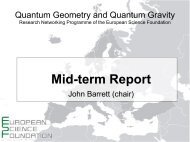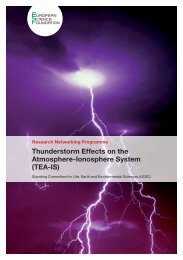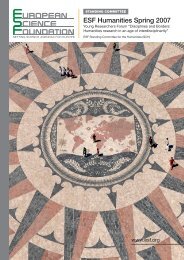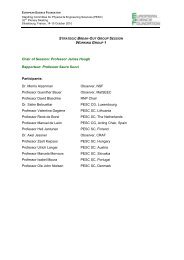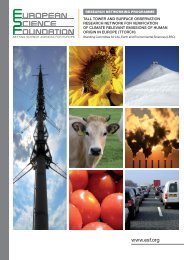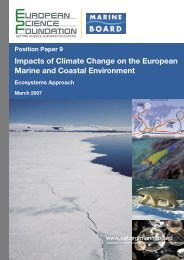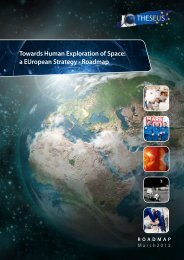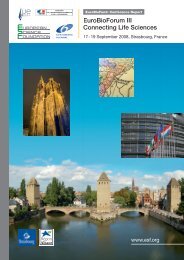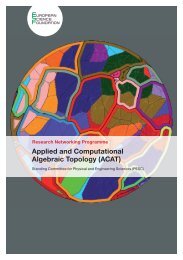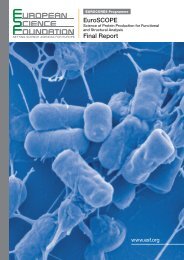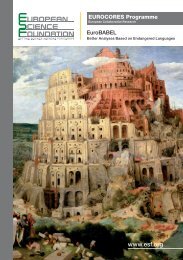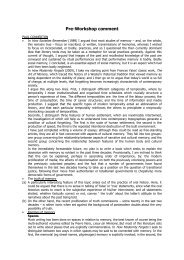The European Code of Conduct for Research Integrity
The European Code of Conduct for Research Integrity
The European Code of Conduct for Research Integrity
- No tags were found...
Create successful ePaper yourself
Turn your PDF publications into a flip-book with our unique Google optimized e-Paper software.
a <strong>for</strong>mal charge. Minor misdemeanours by studentsor junior researchers should however alwaysbe reprimanded and corrected by teachers or mentors.Minor misdemeanours by more experiencedresearchers that leads to misrepresentation may betreated more seriously, and if repeated should beconsidered as misconduct.In addition to the violation <strong>of</strong> the fundamentalprinciples <strong>of</strong> responsible science many other<strong>for</strong>ms <strong>of</strong> poor and inappropriate practices in scienceresearch deserve attention. <strong>The</strong>se include poordata practices and inadequate data management,inappropriate research procedures, including questionableprocedures <strong>for</strong> obtaining in<strong>for</strong>med consent,insufficient respect and care <strong>for</strong> participants in theresearch, improper research design and carelessnessin observation and analysis, unsuitable authorshipor publishing practices, and reviewing and editorialderelictions. Some <strong>of</strong> these are very serious anddiscreditable, e.g. abuse <strong>of</strong> ethical requirements and<strong>of</strong> trust in relation to the public, research subjects orother participants in the research. However, unlikethe fundamental principles <strong>of</strong> scientific integrityand the violation there<strong>of</strong>, which have a universalcharacter, such practices may be subject to differentnational traditions, legislative regulations or institutionalprovisions. A required system <strong>of</strong> regulations <strong>of</strong>good practice in research should, there<strong>for</strong>e, (except<strong>for</strong> gross violations <strong>of</strong> ethical principles or the law)not be part <strong>of</strong> a universal <strong>Code</strong> <strong>of</strong> <strong>Conduct</strong>, butshould be developed in the <strong>for</strong>m <strong>of</strong> national GoodPractice Rules, that would recognise the legitimatedifferences between national or institutional systems.<strong>The</strong> enclosed list <strong>of</strong> recommendations shouldbe used as a guideline <strong>for</strong> the <strong>for</strong>mulation <strong>of</strong> suchnational Good Practice Rules.Investigations <strong>of</strong> research misconduct allegationsshould be consistent with national laws <strong>of</strong> thecountry in which the investigations are conducted.What is required is a due and fair process, that isuni<strong>for</strong>m and sufficiently rapid, and leads to properoutcomes and sanctions. <strong>The</strong> investigations must becarried out in accordance with the highest standards<strong>of</strong> process integrity, uni<strong>for</strong>mity within onedomain <strong>of</strong> jurisdiction, and fairness to all parties.Confidentiality should be observed as much as possible,unnecessary detriment to reputations shouldbe avoided, and a proportionate action should betaken against persons found to have committedresearch misconduct. Wherever possible precautionshould be taken to ensure that investigations arecarried through to a conclusion. <strong>The</strong>y should notcease, leaving questions unresolved, merely becausethe defaulter has left the institution.In international collaboration partners shouldagree to conduct their research according to thesame standards <strong>of</strong> research integrity, and to bringany suspected deviation from these standards, inparticular alleged research misconduct, to theimmediate attention <strong>of</strong> the project leader(s) (and<strong>of</strong> the senior responsible <strong>of</strong>ficer in the universityor institute (employer), in order <strong>for</strong> it to be investigatedaccording to the policies and procedures <strong>of</strong>the partner with the primary responsibility, whilerespecting the laws and sovereignty <strong>of</strong> the States <strong>of</strong>all participating parties. In large scale, funded internationalprojects the promotion <strong>of</strong> good practiceand the handling <strong>of</strong> possible cases <strong>of</strong> misconduct,as recommended by the coordinating committee <strong>of</strong>the OECD Global Science Forum, should be followed.<strong>The</strong> boiler plate text, recommended by this committee,should be embodied in the <strong>for</strong>mal documentsthat establish the collaborative project.2.2 Background and ElucidationIn this section a more extensive elucidation <strong>of</strong> thecondensed <strong>Code</strong> <strong>of</strong> <strong>Conduct</strong>, presented in chapter 1,is given. <strong>The</strong> nature <strong>of</strong> science and scholarship, thevalues to be fostered in scientific and scholarlyresearch, the various discreditable <strong>for</strong>ms <strong>of</strong> misconductwill be discussed, and procedures <strong>for</strong> dealingwith allegations <strong>of</strong> misconduct and rules <strong>for</strong> goodresearch practice will be recommended.2.2.1 Nature <strong>of</strong> science and scholarshipIn a broad sense science (in Latin scientia is knowledge)is the systematised knowledge obtainedthrough observation and experimentation, studyand thinking. It is rooted in human curiosity, thewish to understand the physical, biological andsocial worlds as well as the human mind and itsproducts. Science aims at deepening our understandingand extending our knowledge beyond whatis already known. <strong>The</strong> term ‘science’ is normallyapplied only to the natural and social sciences; inthis document it will be applied in a broader sense,like the German word ‘Wissenschaft’, which appliesalso to the humanities. Of course, there are differencesbetween the various disciplines, sometimeseven indicated as ‘cultural’1, but in this discussionemphasis will be laid on the communalities ratherthan the disparities between the disciplines.1. C.P. Snow (1959), <strong>The</strong> Rede lecture. Cambridge:Cambridge University Press.W. Leppenies (1985), Die drei Kulturen; Sociologie zwischenLiteratur und Wissenschaft. München: Hanser.9<strong>The</strong> <strong>European</strong> <strong>Code</strong> <strong>of</strong> <strong>Conduct</strong> <strong>for</strong> <strong>Research</strong> <strong>Integrity</strong>



